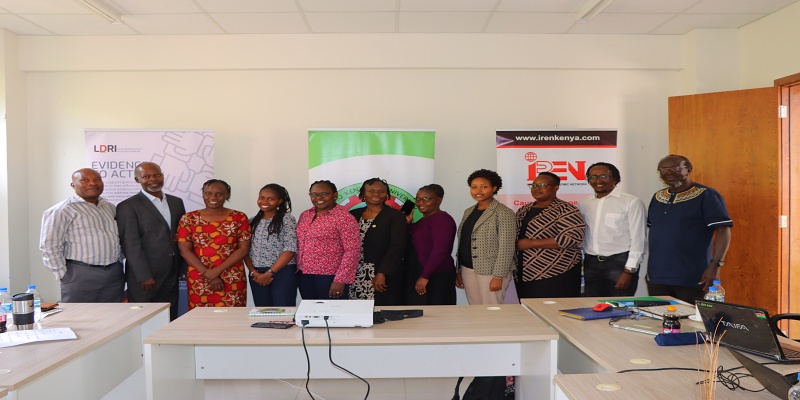JKUAT-led Consortium Wins NRF Grant to Upscale Climate Smart Technologies for Food and Nutrition Security in Kenya

February 21, 2024 – Nairobi. A consortium of multidisciplinary researchers and industry players in the African indigenous vegetables value chains spearheaded by Jomo Kenyatta University of Agriculture and Technology (JKUAT), has won a competitive grant worth KES 15 million from the National Research Fund (NRF) to upscale the African indigenous vegetables (AIVs) climate smart technologies for food and nutrition security in Kenya.
The consortium brings together a team of ten members drawn from JKUAT, IREN Growthpad Ltd, Local Development Research Institute (LDRI) and Masinde Muliro University of Science and Technology (MMUST).
According to NRF Chief Executive Officer, Prof. Dickson Andala, “Despite NRF investing in funding research on food and nutrition security, “there are still gaps in regard to transforming research outputs into tangible goods and services, hence the need to upscale previously funded research projects to ensure that they achieve their intended impact.”
The project, to be implemented over a period of eighteen (18) months, is the first of its kind in the country: “It provides previously funded NRF researchers and innovators in Food and Nutrition Security and Sustainable Agriculture (FNSSA) with tools needed to commercialize their research results and connect with potential customers and investors,” states NRF.
Prof. Mary Abukutsa is the Principal Investigator and Project Coordinator, assisted by Prof. Anselimo Makokha, Dr. Eucabeth Majiwa, Ms. Joyce Njenga and Patrick Amunavi (all from JKUAT) and Dr. Anne Aswani of MMUST. The private sector partners are: IREN Growthpad Ltd represented by Mr. James Shikwati and Ms. Esperance Chesoli; Mr. Muchiri Nyaggah and Ms. Judy Mumba (both from LDRI).
In an effort to ensure sustainability of the project aims, two early career researchers – Dr. Anne Aswani and Dr. Eucabeth Majiwa, are being mentored under the project’s young researchers’ mentorship program.
The Principal Investigator, Prof. Mary Abukutsa said the NRF-UPSCALE-AIVs Project is a follow up of previous research project funded by NACOSTI titled, “Improving the quality of African Indigenous vegetable seed systems for enhanced food security and climate change resilience (2010-2018).”
Prof. Abukutsa notes, “Due to the prolonged and recurrent drought experienced by about half of the counties, the production of predominant staple foods has been inadequate to meet food requirements in the country. African indigenous vegetables have great potential to address the problem since they are better adapted to the environment and mature within a very short time.”
She identifies challenges that affect their production as; poor quality seeds, unavailability of improved agronomic, preservation and preparation packages. They are mainly produced at subsistence level.
The UPSCALE-AIVs project therefore aims at using smart technologies to upscale the commercial production of registered varieties of two AIVs, namely, the African nightshade (Managu) and Jute Mallow (Mrenda).
This, the consortium notes, “will contribute to the achievement of food and nutrition security in Kenya, alleviate malnutrition, curb diseases that are partly due to diets high in starch but low in vegetables and fruits, increase foreign exchange earnings as dried vegetables will be marketed to Kenyans in the diaspora.”
The project’s objective-based deliverables include; popularity and acceptability of registered varieties of AIVs, increased productivity and availability of AIVs, increased availability of recipes and consumption of AIVs, increased trade in domestic and international markets, improved economic status of the women farmers and increased awareness and change of attitude by the general public and policy makers.
While focusing on upscaling already developed technologies and commercialization of African indigenous vegetables for improved economic status and development of Kenya, the UPSCALE-AIVs project will be implemented in Kakamega and Kiambu counties.
It will ensure gender equality, inclusivity, public-private partnerships, and will rope in the agriculture, trade and industry, and health sectors at national and county government levels.
Director of IREN Growthpad, Mr. James Shikwati said, “We are privileged for the partnership between IREN Growthpad Ltd and esteemed institutions JKUAT, MMUST and LDRI, powered by the Kenya National Research Fund. IREN Growthpad Ltd is at the forefront of promoting consumer wellness, revolutionizing the way Kenyans experience AIVs and supporting smallholder farmers by guaranteeing market access to AIVs.”
Through the partnership, Mr. Shikwati said, “we will be introducing AIVs in various formats– fresh, dried and powdered, opening a world of culinary possibilities. This initiative will not only enrich the Kenyan palate but also contribute significantly to the popularization and increased consumption of AIVs.”
Executive Director of LDRI, Mr. Muchiri Nyaggah, said, in its mission to support African countries to end hunger, extreme poverty and reduce inequality, “LDRI has a particular focus on supporting smallholder farmers to access appropriate technologies, new farming methods and enhancing farmer education through technology transfer and knowledge exchange.”
Mr. Muchiri noted that LDRI is excited to work with JKUAT, MMUST and IREN in upscaling AIVs which are an important part of dietary diversity, better nutrition and improved incomes for farmers and rural communities.
“We believe, upscaling of AIVs in Kenya will contribute to increased food security and resilience in smallholder agriculture through AIV commercialization and consumption,” concluded Mr. Muchiri.
NRF has aligned its research and innovation funding programs to national research priority areas guided by the development goals as spelt out in the Kenya Vision 2030, Medium Term Plans (MTPs) and the Bottom-up Economic Transformation Agenda (BETA).
The NRF call was formulated with support of Canada’s International Development Research Centre (IDRC) through the Science Granting Councils Initiative (SGCI).
For more information contact:
Principal Investigator/ Coordinator
Prof. Mary O. Abukutsa,
Department of Horticulture, JKUAT
Email: abukutsa.mary@gmail.com
